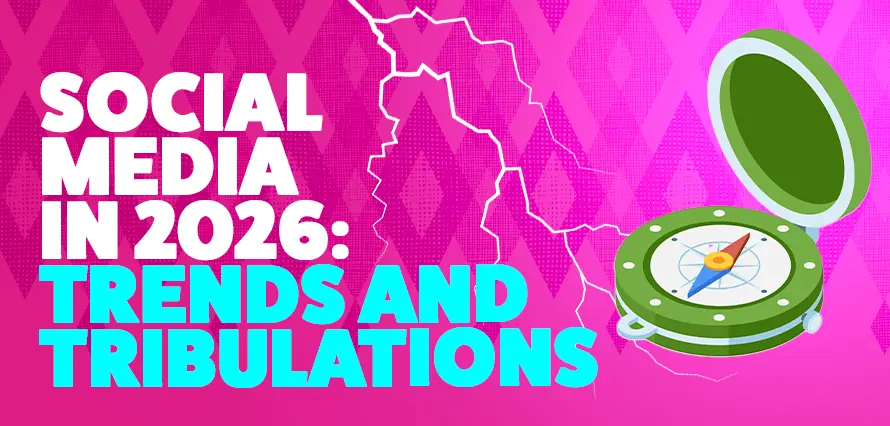October 2, 2025

The social media landscape has undergone another seismic shift, and brands that fail to recognise the growing trust gap between marketers and consumers risk being left behind – that’s according to Brandwatch’s 2026 State of Social report.
Analysing 910 million online mentions, Brandwatch has found that brands initiate less than 1% of brand-related conversations online. The real opportunity lies in the other 99% – and those conversations increasingly point to a widening trust crisis.
We look into this element of the report, and more – below.
Is There a Trust Breakdown?
According to Brandwatch’s report, those old hidden fees and deceptive pricing practices are fuelling consumer frustration across industries. Such conversation topics grew 40% in 2025, with 30% more new voices joining the conversation. But pricing deception isn’t the only culprit – product disappointment is sparking an even louder backlash. Mentions of “deinfluencing” surged 79% in 2025 as frustrated customers actively discouraged others from buying products that didn’t meet expectations.
The deinflucing trend isn’t new; as the transparency behind paid advertising is…well clear for all to see. Who can you really trust as far as influencers go?
Elsewhere, customer service remains another critical pain point. Calls to boycott surged 95% in the first half of 2025, with mentions of “do not buy” climbing to 836,000 posts.
In finance, 36% of customer service mentions are negative – the highest across industries.
The food service sector gave…well, food for thought: 46% positive mentions but also 33% negative, showing how service quality can make or break experiences – and how the increasing cost of food demonstrates the desire to speak about it even more. Are people getting what they pay for?
Digital Wellness Taking Centre Stage
It appears consumers are actively seeking healthier digital experiences as constant connectivity takes its toll. Mentions of anxiety in social media and mental health conversations are up 25%, while digital detoxing mentions gained momentum with a 10% increase in early 2025. Conversations about social media being “fun” have been in steady decline since 2023, demonstrating something of a burnout feeling among its users.
Not a huge surprise here…too much social is bad for the brain…(we say this as a social media agency!)
What’s interesting is that smart brands aren’t fighting this trend. The message appears to be that supporting digital wellness isn’t anti-engagement; it’s about earning permission for meaningful interactions…and what’s more, a rested mind probably is better for everyone.
An Authenticity Revolution
More than half (54%) of ad-related online conversations show the emotion ‘anger’ (or at least that’s how Brandwatch deems is), with consumers pushing back against clickbait and intrusive ads. Nearly 90% of clickbait mentions in 2025 were negative, revealing that manipulative tactics are finally backfiring at scale. It’s about damn time!
In influencer marketing, authenticity has become non-negotiable.
While influencer conversations surged 20% in early 2025, mentions of authenticity in influencer discussions grew 66%. Finance-related influencer discussions carry the most negativity at 40%, with consumers expressing concerns about misleading promotions and financial losses from scams.
In contrast, consumer packaged goods (CPG) influencer conversations are largely optimistic, with micro-influencers gaining traction as effective marketing partners. Is this because there is more trust in smaller accounts who will be perceived as more genuine? Perhaps. But this is certainly something for larger brands to consider.
AI’s Mixed Reception
Apparently AI adoption is creating both excitement and anxiety. The energy sector shows some of the strongest positive and negative conversations, with over 30,000 mentions of AI-related energy and climate issues – a 32% increase from the previous six months. In automotive, while innovation is generally welcomed, frustrations emerge when AI systems miss the mark.
The consensus? Consumers want AI that enhances human connection, not replaces it. Brands that position AI as an empowering, transparent support system will succeed where those treating it as a simple replacement for human interaction will struggle…although it seems there are many brands who are desperate to this on the down-low.
Platform-Specific Strategies Matter in 2026
Success in 2026 demands platform-specific expertise.
- TikTok thrives on authenticity and trend participation, with Gen Z leading the charge.
- Instagram rewards visual storytelling and community-focused content.
- LinkedIn demands professionalism and thought leadership, resonating most with Millennials and Gen X now more than ever (see our blog on the hidden B2B buyer!)
- Reddit requires genuine person-to-person interactions without overt promotion.
- We love Reddit for B2B btw!
The Bottom Line
Based on Brandwatch’s incredibly thorough and impressive research, 2026 is the year of trust. It’s become the real currency in online interactions.
Consumers are rewarding brands that deliver transparency and authenticity while punishing those that don’t – so the marketers who succeed will be those who embrace radical honesty, prioritise customer wellbeing, and create value-first connections.
In our view, the opportunity is massive for brands willing to listen to the 99% of conversations happening without them – and respond with genuine care rather than promotional noise.
To quote Kendrick Lamar “the audience is not dumb” – transparency will breathe life into your campaigns and is more likely to hit the mark.
If you’re looking for advice on how to commence your social campaigns or strategy in 2026 (or this year, even!) do get in touch.
*All data sourced in this blog is from Brandwatch’s 2026 State of Social report, as linked to at the start of this blog.